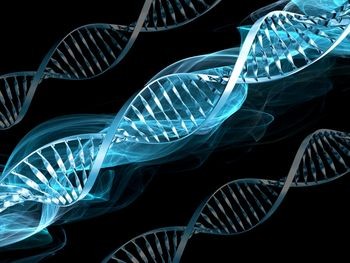As we highlighted this week in Gene-ius, a dramatic, life-improving breakthrough is on the horizon in gene therapy. Researchers from Oregon Health and Science University (OHSU) revealed a new method that can successfully prevent dementia, diabetes, deafness and other inherited diseases caused by mutations in mitochondria—the DNA that acts as an energy engine in every cell. In a peculiar twist, the procedure would result in a child having DNA from two mothers.
“When certain mutations in mitochondrial DNA are present, a child can be born with severe conditions, including diabetes, deafness, eye disorders, gastrointestinal disorders, heart disease, dementia and several other neurological diseases,” explained lead researcher Shoukhrat Mitalipov. “Because mitochondrial-based genetic diseases are passed from one generation to the next, the risk of disease is often quite clear. The goal of this research is to develop a therapy to prevent transmission of these disease-causing gene mutations.” The scientists are hoping to begin clinical trials with human subjects in the near future.
Newborns get their mitochondria entirely from the mother (designated as mtDNA) as the sperm head carries no mitochondria. It’s estimated that one out of every 5,000 to 10,000 babies is born each year with some type of disorder related to faulty mtDNA, which works out to 1,000 to 4,000 newborns in the United States alone.
Traditional gene therapy consists of trying to fix faulty segments of mtDNA. Mitalipov’s team made the radical decision to replace all of the mtDNA in an egg with mtDNA from a healthy donor. The best way to do that, they reported, is to use the donor’s entire egg, with one exception: The egg cell’s chromosomes are removed and replaced with chromosomes from an egg from the donor. In that way, the new baby would retain all of the birth mother’s genetic characteristics (inherited from the chromosomes), minus the birth mother’s faulty mtDNA—and the disease carrying mutations.
By every reasonable measure, this is science at its best and most conservative. The OHSU researchers worked under the college’s Oregon National Primate Research Center (the original work was on primates) as well as its Department of Obstetrics and Gynecology. Although the procedure is not yet approved in the US— any clinical trials related to gene therapy would have to be first approved by the Food and Drug Administration—the United Kingdom is considering its use in treatment of human patients who have a higher likelihood of suffering from mitochondria-based disease.
Investigators based at Newcastle University had utilized a similar method in an experiment by transferring the mother’s DNA after the egg was fertilized rather than before and the method has a lower chance of producing defective embryos. Lead Newcastle researcher Douglass Turnbull called the findings “very important and encouraging,” although he noted that “safety is an issue.”
The reaction by genetic research skeptics was disappointing if predictable. Dartmouth bioethicist Ronald Green played the Gattaca card, raising the specter of creating genetically superior humans. “It could easily move into the realm of gene enhancement,” Green told NPR. “Higher IQ. Improved physical appearance. Athletic ability. That’s a worry to some people—to many people.”
The Center for Genetics and Society, which often takes a precautionary and reactionary view of human genetics, condemned the breakthrough. “That kind of genetic engineering has been ruled off-limits,” CGS Associate Executive Director Marcy Darnovsky, told Rob Stein on NPR. “And it’s a very bright line that has been observed by scientists around the world.” Darnovsky has no science training but holds a doctorate in History of Consciousness from the University of California-Santa Cruz.
Darnovsky is wrong. It has not been “ruled-limits” by scientists in the US or elsewhere. This research is entirely mainstream and cutting edge and is being aggressively and cautiously pursued by scientists and genetic health professionals around the world.
Such research may worry bioethic extremists but their concerns, as articulated over the past week, are far fetched. Their recommendations—do not cross this bold “red line” in the words of Darnovsky—would be a death sentence to thousands of newborns each year. Scientists are targeting genetic disorders—diseases that would leave children permanently disabled and could cause physical and psychological harm to the birth mothers and their families as well.
“In severe cases, the child will die in the first days of life, or they might live, you know, a few years and then die,” said reproductive biologist Mary Herbert, who was part of the Newcastle research team. “It’s like a game of Russian roulette.”
Darnovsky, Green and the like represent a small but influential faction in the bioethics community. They regularly present the most exaggerated and implausible scenarios, suggesting catastrophic consequences unless society embraces their recommended policy solution—shut down all germline research. Scientists do not work in a social and regulatory vacuum. They necessarily will be responsive to reasonable oversight, which is not what hyperbolic critics have in mind.
Considering the echo chamber effect of the Internet, even minority voices can drive science policy if they can stir up fears—something CGS has become expert at. In this case, let’s hope that the public and regulators differentiate between exaggerated hypothetical concerns and real-life health challenges. Literally thousands of lives could be saved by these procedures. The Newcastle researchers are awaiting a decision by the British government on whether they can proceed to the next step in their research. Mitalipov has already asked the FDA if he can try to make a healthy baby by genetically altering human eggs.
Jon Entine, executive director of the Genetic Literacy Project, is a senior fellow at the Center for Health & Risk Communication at George Mason University.








